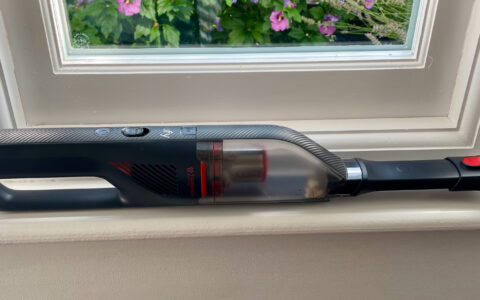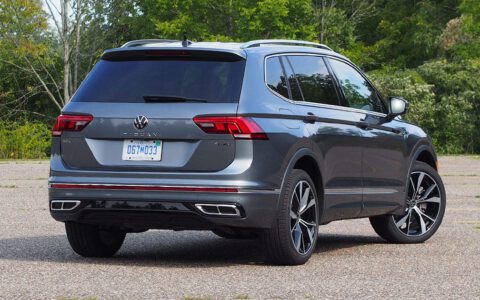
[ad_1]
Antuan Goodwin/Roadshow
There are so many exciting things happening at Ford right now. The rough and tumble Bronco arrives this year, following the launch of the tiny-tough Bronco Sport. There’s now an electric Mustang SUV. Heck, the F-150 is a dang hybrid with an inverter so beefy that it can power an entire house. So where does that leave other products, like the Escape?
LikeStrong acceleration from 2.0-liter EcoBoost engineSync 3 has excellent voice command and smartphone connectivityTop notch driver-assistance and parking tech
Don’t LikeInterior feels a touch cheapOdd ergonomics
The 2021 Ford Escape is not a particularly exciting ride, even loaded up in Titanium trim with its most potent EcoBoost turbocharged engine. It’s just a fine and comfortable commuter with broad appeal. Unable to get by on playing to emotions and hype, the humble Escape is faced with, in many ways, a much harder task than its more spectacular stablemates: to sell itself on practicality and value alone.
I suppose you’d get used to it, but finding the Escape’s tucked away Start button was my first challenge.
Antuan Goodwin/Roadshow
EcoBoost with AWD
The first thing I notice about the Escape? The oddly positioned engine start button. It’s crammed into a little nook behind the steering wheel and nearly impossible to see from the driver’s seat without craning my next and contorting my wrist. Not a good ergonomic introduction.
Fortunately, that button fires up a potent little engine: Ford’s 2.0-liter EcoBoost four-cylinder with 250 horsepower and 280 pound-feet of torque. Paired with an eight-speed automatic transmission, the Escape accelerates with surprising eagerness and has a very responsive throttle. I’d say the Escape 2.0T has some of the best get-up-and-go in the compact crossover class.
Stop-start fuel-saving tech helps the EcoBoost 2.0T achieve an EPA-estimated 23 miles per gallon city, 31 mpg highway and 26 mpg combined — numbers that are unchanged from last year’s estimates. During my highway-heavy 294.6 miles of testing, I averaged 28 mpg even.
Escape buyers can opt for a smaller, 1.5-liter, three-cylinder EcoBoost engine with 181 hp, as well as 200-hp hybrid and plug-in hybrid models. The entry-level 1.5T — which we drove last year — is the most affordable trim and probably a better apples-to-apples match with the likes of the non-hybrid RAV4 and CR-V in terms of power and efficiency. The electrified models are the most efficient variants of the Escape, averaging 41 mpg with the conventional hybrid and offering an additional 37 miles of electric cruising range with the plug-in.
With standard all-wheel drive and 3,500 pounds of towing capacity (when equipped with the trailer tow package), the 2.0T is also the most capable version of the Escape; lesser engine options only allow it to tow 1,500 pounds. Handling and braking feel about on par with the rest of the small SUV class — more people-mover than canyon-carver — so don’t expect to be blown away by the Escape’s performance.
The Escape features multiple driving modes to help you fine-tune the SUV’s behavior, ranging from sporty to thrifty, but I find it’s annoying to toggle between these settings. There’s only one button and it cycles through the Escape’s five drive modes — Normal, Eco, Sport, Rain and Snow. So while going from Eco to Sport is one tap, getting back to Eco or Normal takes four or five, assuming you don’t accidentally tap too quickly and overshoot it.
The larger EcoBoost engine increases the Escape’s towing capability from 1,500 to 3,500 pounds.
Antuan Goodwin/Roadshow
Creature comforts
On the outside, the Escape’s smoothed-over design is quite car-like and approachable. The size is good for easy urban parking and, from the driver’s seat, the SUV boasts pretty good visibility in all directions. My example features a hands-free power liftgate that opens smoothly and quickly with a kick beneath the bumper.
Inside, Ford’s designers tried to create a premium feel with a bunch of faux exposed-grain wood and, on my Titanium model, leather-trimmed seats. Aside from the aforementioned start button, the dashboard and console controls feel nicely positioned. However, the wood looks really fake when you give it a closer look. A lot of the cabin materials — like the hard plastic door cards and easily scratched lower dash — feel cheap.
Ford makes up for this with a few solid tech features. B&O badges indicate premium sound provided by high-end audio manufacturer Bang & Olufsen. Sound quality is above average to my ear, but not audiophile level. A digital instrument cluster with separate themes for Sport and Normal driving plays nice nature-inspired animations on startup and shutdown. Also optional is a visor-style head-up display that rises from the top of the instrument cowl. I’d prefer HUDs be projected directly on the windshield, but any HUD is better than no HUD at all.
The Escape’s cabin is nice, if you don’t look too closely.
Antuan Goodwin/Roadshow
The main event where tech is concerned is the Sync 3 infotainment system. Its software is well organized and its feature set checks all of the right boxes, with USB connectivity, Android Auto, Apple CarPlay, Amazon Alexa integration, Bluetooth and satellite and HD radio tuning. Voice-activated navigation has been a hallmark of Sync since its inception and continues to work well here, with excellent natural-language recognition for addresses.
The Escape also features Ford’s Co-Pilot 360 Assist, a standard suite of driving aid features, including pre-collision assist with automatic emergency braking, lane-keeping assist, blind-spot monitoring and rear cross-traffic alert. Stepping up to the Titanium trim — or optioning Co-Pilot 360 Assist Plus — adds adaptive cruise control that works in stop-and-go traffic and traffic-sign recognition, both of which are new for 2021. The Plus upgrade also includes lane-centering steering assist and a feature called Evasive Steering Assist which works in concert with the emergency brake assist to help drivers to steer around obstructions.
As always, Ford’s Active Park Assist — now in its second generation — is still exceedingly competent and at times easier to operate than parking it yourself, requiring just a single button press to enter parking mode while the vehicle handles steering, shifting and braking.
Strong Sync 3 infotainment makes up for some of the cabin’s shortcomings.
Antuan Goodwin/Roadshow
It’s fine and that’s OK
The 2021 Ford Escape starts at $26,130, including a $1,245 destination charge, for a base 1.5T S model with front-wheel drive. Fully optioned, the 2.0T AWD Titanium tops out at $40,820 — interestingly, a skosh higher than the loaded Hybrid Titanium’s $39,435.
Option the 2.0-liter EcoBoost and the Escape boasts a slight performance advantage over much of this class. However, the more common 1.5-liter model lacks that advantage and the newly updated Nissan Rogue, the Kia Seltos and Toyota’s RAV4 become threats with more comparable on-road manners and slightly better interior quality. The Kia, for example, is much less expensive than the Ford when comparably equipped. The Escape’s tech is still top notch — particularly its one-button parking technology — but that’s not as much an advantage as it used to be now that the competition has caught up during this latest generation. At the other end of the spectrum, the Subaru Crosstrek and Ford’s own inbound Bronco Sport appeal to drivers looking for more off-road utility in their small SUVs.
The 2021 Ford Escape isn’t the most exciting thing Ford makes right now, but it’s still a very competent player. As a volume seller, it’s a very important model to Ford’s bottom line.
[ad_2]
Source link




